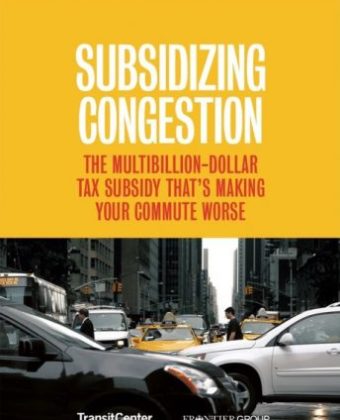Executive Summary
The federal government provides subsidies through the tax code for employer-provided and employer-paid automobile parking, transit passes, and some other commuter expenses, but it does so in ways that run counter to the nation’s overall transportation goals.
Ultimately, the effect of the tax benefit for commuter parking is to subsidize traffic congestion by putting roughly 820,000 more cars on America’s most congested roads in its most congested cities at the most congested times of day. It delivers the greatest benefits to those who need them least, typically upper-income Americans, and costs $7.3 billion in reduced tax revenue that must be made up through cuts in government programs, a higher deficit, or increases in taxes on other Americans.
The tax benefit for commuter transit only weakly counteracts the negative impact of the parking tax benefit. The transit tax benefit reaches too few people, and the drop in its value compared to that of the parking tax benefit at the beginning of 2014 limits its potential to get cars off the road.
We estimate that the parking and transit tax benefits together account for an estimated $8.6 billion total in forgone federal and state income tax and payroll tax revenue each year. The high cost and significant transportation impact of commuter tax benefits demand that the federal government undertake a detailed evaluation of the benefits and initiate reforms to ensure that they support, rather than hinder, achievement of the nation’s transportation policy goals and fiscal priorities.
Recommendations
Eliminating the parking tax benefit would stop encouraging workers to drive to work in single-occupancy cars during rush hour in our most congested cities—a practice that contradicts the nation’s transportation policy objectives.
Many transit users currently receive no transit tax benefit, either because their employers do not have a workplace transit benefits program or because they use transit for purposes other than getting to and from work. The current transit benefits program provides greater rewards for higher-income transit commuters than for middle-income or working class users.
The federal government should explore possible replacements for the current transit tax benefit that deliver financial support to a broader range of transit-system users while making the system more equitable.
Should Congress choose to maintain the current framework of commuter tax benefits, it is essential that the transit benefit be expanded and improved in order to provide an effective counterweight to the parking benefit. Specifically, the government should:
- Increase the maximum value of the transit tax benefit. At minimum , parity should be restored between the transit and parking tax benefits.
- Require employers that offer tax-free parking to their employees to also offer transit benefits or empower their workers to “cash out” the value of the subsidized parking.
- Expand the scope of commuter tax benefits to include benefits for bikesharing and carsharing and to provide parallel benefits for workers who carpool.
Press Release
New Report: Parking Subsidies Leave Taxpayers Shouldering $7.3 Billion Burden Annually
Report found that the federal parking subsidy puts 820,000 more cars on America’s most congested roads in its most congested cities
New York, NY – The commuter parking benefit results in $7.3 billion in forgone revenue annually while also increasing traffic congestion in our most congested cities, according to a new report, “Subsidizing Traffic Congestion: The Multibillion-Dollar Tax Subsidy That’s Making Your Commute Worse,” released today by the civic organizations TransitCenter and Frontier Group. The report also found that the $1.3 billion public transportation benefit removes only about a tenth of the roughly 820,000 cars added to the road by the parking subsidy.
“The government should update its tax incentives to influence travel demand so that they fit the needs of today’s commuters,” said David Bragdon, Executive Director of TransitCenter. “Regardless of whether the Treasury is spending dollars or not collecting them in the first place, those dollars ought to be targeted for maximum positive impact on our transportation system.”
Currently, employees who drive to work may receive up to $250 a month tax-free for employer-paid or employer-provided parking through reimbursements, vouchers or free parking if it has market value. Typically, these subsidies deliver the greatest benefit to the wealthy and people who work in dense employment centers, such as downtown areas that are already prone to traffic congestion during the morning and evening rush hours.
“Most Americans might think that the parking tax subsidy benefits them,” said Tony Dutzik, senior policy analyst at Frontier Group and lead author of the report. “But we found the opposite: while only about a third of us benefit from the parking subsidy, everyone pays in the form of more congestion and an increased tax burden.”
In January of 2014, the law which maintained parity between the transit and parking subsidies expired and without Congressional action to extend it, the maximum amount transit commuters could receive tax-free through their employer fell to $130 a month. Restoring parity would help, by encouraging commuters with more expensive transit commutes to continue to leave their cars at home. Even with parity, however, the net effect of the parking and transit subsidies, for those workers with access to both, is to cancel each other out.
The high toll of the parking benefit is further exacerbated by the fact that it touches on such a small portion of the U.S. workforce: while one third of U.S. workers receive parking benefits, only 2 percent receive transit benefits. In spite of its detrimental effects on the transportation system, the parking benefit was created with no transportation purpose whatsoever.
In order to align tax policy with the nation’s transportation goals, TransitCenter and Frontier Group recommend that the federal government:
- Eliminate the parking benefit;
- At least restore parity between parking and transit benefits; and
- Explore improvements to the current transit benefits – such as refundable tax credits for household transit expenditures – that deliver financial support to a broader range of transit users
Please direct all questions to Jon Orcutt at [email protected]

